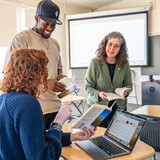This week NWU biology students are practicing their diving skills in the campus swimming pool. Next week they’ll put those skills to the test on the northwest coast of Roatan, Honduras where they will experience 30 miles of fringing barrier reefs, seagrass beds, mangroves and shoreline.
Nebraska Wesleyan’s “Applied Marine Biology” course is taught biannually at the Roatan Institute for Marine Sciences. It gives students hands-on experience studying coral, fish and algae identification; dolphin biology, reef formation, and global reef conservation.
“We’re in Nebraska,” said biology professor Jerry Bricker, who is leading his seventh study abroad trip to Central America. “What better way to learn than to immerse them in the habitat.”
Students will spend 15 days in Honduras. Their experience includes two daily dives. They spend their evenings participating in lectures and lab activities.
To prepare for the study abroad course, students were required to take “Principles of Marine Biology” this spring where they learned to properly identify organisms and discussed the issues surrounding humans’ impact on ecology. In addition, students were required to become certified open water SCUBA divers prior to departing for Honduras.
“Studying abroad is a great way to teach,” said Bricker. “We can show them in the book what something looks like but when we immerse them, we’re able to show them exactly what we’re talking about.”
“Students are so engaged,” he continued. “They give me 120 percent on these trips and that re-energizes me as a teacher.”
Two other academic trips are taking place this summer.
- Thirteen psychology students will participate in a “History and Systems” course in London and Paris. Psychology professor Jerry Bockoven has dubbed the trip “Freud’s Couch Tour.” In London, their travels will take them to the Freud Museum, where Freud’s belongings are housed including his famous couch on which psychotherapy was born. Students will also visit the Galton Collection. Galton was one of the first persons who attempted to measure intelligence. In Paris, students will visit Pitie-Salpetriere Hospital where Freud studied as a college student and where Phillipe Pinel released mental patients from their chains in 1795, which initiated worldwide reform in the treatment of the mentally ill. “I want them to see that the people and places that were pivotal in psychology’s history were just as real at one time as our reality is today,” said Bockoven.
- On July 1, six students will travel to Alicante, Spain, where they will immerse themselves in the culture. Students will live with host families, attend daily four-hour Spanish language classes and tour many sites in and around Alicante including the medieval Castle of Santa Barbara and the famous Alhambra Palace in Granada; they will also tour Madrid.













